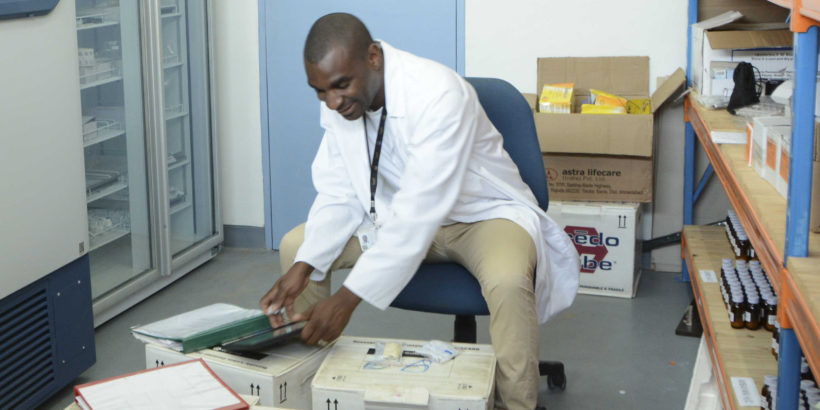Vaccines are essential for disease control and prevention. Generating data and demonstrating the impact of new vaccines in endemic settings is critical to assess vaccine effectiveness and support decision-making. The Typhoid Vaccine Acceleration Consortium (TyVAC) is conducting a study in Malawi using the World Health Organization-approved typhoid conjugate vaccine (TCV); data from the study will be the first from Africa.
The cold chain is an integral component of vaccine management in a clinical trial and requires maintenance of temperatures ranging from 2oC to 8oC during the transport, storage, and handling of the vaccines. This was a challenge in Malawi due to:
- The size of the study (28,143 participants);
- Vaccinating at field sites verses healthcare facilities, which required additional transport, and;
- The high temperature at the vaccination sites (usually between 25oC–32oC) with vaccination activities occurring for around four hours every day.
During the study, 1,440 vials of TCV and 770 vials of the control vaccine, meningococcal conjugate vaccine, were stored at the Malawi-Liverpool-Wellcome Trust research pharmacy. The vaccines were transferred daily to field vaccination sites. The vaccines had to be maintained at the correct temperature during storage and transport.
Vaccines can be damaged due to exposure to excessive cold, heat, or light. There are many reasons why the cold chain breaks down, including power interruptions, equipment problems, and handling errors. An effective cold chain requires training for all employees, proper handling, equipment for storage and transport, and site-specific policies, procedures, and protocols.

TyVAC Malawi used temperature monitoring and control devices with short message service and email alarms to monitor and control temperature. We instituted clearly defined accountability measures and used credo cubes, which are essentially fancy coolers for medical materials, to transport vaccines from the research pharmacy to field sites. Good cold chain management ensures vaccine quality and gives confidence in good pharmacy practices. TyVAC Malawi’s close monitoring shows the cold chain can be well managed at different sites provided staff are well trained in conditioning credos, temperature monitoring, and transportation. Data from field site vaccine administration during clinical trials show what is feasible for national vaccination programs and large-scale cold chain management.
While the cold chain is essential to effective vaccination, there are still other important factors. The TyVAC Malawi team developed robust community engagement that was integral to the enrollment for such a large study. As part of the community engagement, we used music that I wrote and performed. The songs and activities provided a fun and informative way to communicate to children the importance of typhoid vaccines in Ndirande, Blantyre, Malawi. Through the music, we increased engagement and interest in the study, which further necessitated the importance of the cold chain. The system used by TyVAC Malawi is a successful example of cold chain management in a large clinical field trial in Africa that can serve as a model for other studies and sites.



